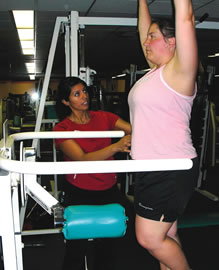Tips From The Fitness Challenge

Meadow Gold Women’s Challenge
contestant Natasha Piper sweating it
out with 24 Hour Fitness trainer Alana
Gonzales
I am currently involved with Meadow Gold’s Women’s Challenge, which educates, encourages and inspires women to make healthful, positive lifestyle changes. Meadow Gold is challenging four local women to incorporate a diary, a healthful diet and physical activity into their lifestyle, and is giving them the tools to make these changes successfully.
The challenge provides a personal trainer from 24 Hour Fitness, and nutrition counseling by yours truly.
These four women are halfway through the three-month challenge, and I am extremely proud as each has made substantial progress in meeting individual weight loss, nutrition and fitness goals. Their weight loss journey has inspired me to write about some of the diet-related challenges they face, as well as best practices used to help overcome them. Here they are:
Identifying the Problem: Dear Diary ...
Self-awareness and behavior reflection are the first step in recognizing any problems that may exist. Keeping a food diary will definitely shine a spotlight on those problems. Designate a small notebook and write down everything you consume - meals, snacks, beverages, condiments - I mean everything. Note the food item, the exact amount, time you ate and even the mood you’re in. Try this for three days and review. Can you spot trends (i.e. I’m a snack-a-holic, emotional eater, overeater, etc.)? Oftentimes just seeing the total amount eaten in a day make us realize that it is too much, or that the food choices we make could use improvement.
“The Women” constantly tell me that they made better food choices or choose not to eat unhealthy foods because they just didn’t want to write it in their diary. A food diary is a definite way to become conscious about your eating habits while showing you where improvements can be made.
Once you determine your problem areas, put together a plan of action to remedy. Here are a few areas I worked on with “The Women”:
Portion Control
Portions of food here in Hawaii are large. Typically there are leftovers at any meal if you’re eating out. Do you feel the need to finish all the food on your plate? I can surely relate.
I’m convinced that I’m genetically programmed to eat all of what’s on my plate, but realistically I know that’s ridiculous.
What works here? Try requesting a takeout container before you start eating, and put half of what’s on your plate in the container to take home to eat on another occasion. You have now controlled how much you are going to eat at that particular sitting, and can still clean your plate too. Oh, and trust me, if you put half your food away in a takeout container beforehand, you’re not likely to take it back out after eating your entire plated portion already.
Stop at Six
Overeating is the most commonly stated problem that people have when it comes to bad eating habits.
There are many methods of controlling your portions (as above), but it is helpful to understand your body and determine an internal gauge as to what really is enough food. Listening to your physical body cues will help you figure out when you should put the fork down and stop eating.
Try to imagine a scale from one to 10, one being starving, 10 being so uncomfortably stuffed that you’re nauseous. Typically you want to stop eating when you’re at a five or six (comfortable) on the scale. You should feel satisfied with the amount you ate and not feel full.
The key to this exercise is consistency, which allows you to physically retrain your body to adjust to less food. Your stomach is a muscle that stretches, the more you keep stretching it by overeating, the bigger it gets, the more capacity it will have and the more food you need to eat to feel full. Consistently eating until you’re comfortable retrains your body to be satisfied with less food at each sitting.
You Are Not a Garbage Disposal
Do you feel the need to finish other people’s leftover food so it doesn’t go to waste? Yes, there are starving people all over the world (as my mom and everyone else’s mom ensured we knew about), but finishing all your food or someone else’s doesn’t help a single one of them. We need to care enough about ourselves and our own health, especially if this is a detrimental habit.
It may sound cliché, but we need to care for ourselves in order to be there to help others (that’s why you’re instructed to place the oxygen mask on yourself before placing one on your child in an airplane emergency).
Just let it go ...
The Buddy Network “The Women” are not only accountable to themselves, but also to the hundreds of thousands of MidWeek readers, KSSK, KCCN and KRTR radio listeners that follow their progress - now that’s pressure! Telling others about your specific nutrition plans and goals is a good way to build a support system and motivate you to stick to your plan. There is nothing like having to be accountable to those around you, especially those you frequently break bread with.
“The Women,” without a doubt, will be successful in meeting their individual health and fitness goals. Each participant already feels her new lifestyle changes are rewards in themselves. All are traveling on a path to a happier and healthier life. I invite you to take their example and challenge yourself to make the necessary changes in your life to follow a similar path!
Mia Inoshita is a dietitian at Meadow Gold Dairies. .(JavaScript must be enabled to view this email address)
E-mail this story | Print this page | Comments (0) | Archive | RSS Comments (0) |
Most Recent Comment(s):





 Del.icio.us
Del.icio.us







